INTERNACIONAL
Los números de la política migratoria de Trump: 239.000 deportados en 6 meses y otros 13 millones en la mira
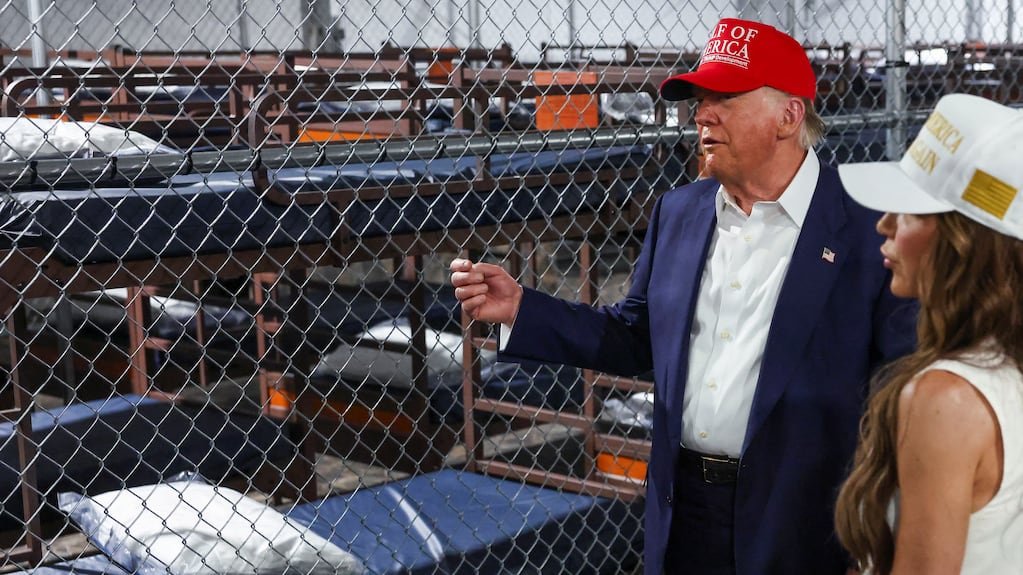
Donald Trump no está conforme con los números de deportados en los primeros seis meses de gobierno y quiere acelerar las expulsiones de extranjeros de aquí a fin de año.
En la mira no solo están los inmigrantes indocumentados, los más débiles de la cadena. También apunta contra aquellos hasta ahora amparados bajo un estatus migratorio precario o quienes tienen en regla su “green card” (el valioso permiso de residencia) pero que hayan delinquido.
Leé también: Trump quiere deportar a ciudadanos naturalizados o con “Green Card” que hayan mentido o cometido delitos
Le paso a Chris Landry, un inmigrante canadiense residente en Estados Unidos desde hacía 40 años y con cinco hijos estadounidenses. De regreso de una visita a su Canadá natal, no le dejaron reingresar al país. ¿Por qué? Tenía antecedentes. En 2004 y 2007 le abrieron dos causas: una por posesión de marihuana y otra por conducir con la licencia suspendida. Lo separaron de su familia.
Pero para Trump no es suficiente. El polémico plan migratorio está lejos del millón de indocumentados deportados por año que se propuso como objetivo al inicio de su gestión el 20 de enero, hace seis meses. Las cifras de detenidos y expulsados no cumplieron la meta del presidente estadounidense.
Leé también: Miedo entre los inmigrantes: “No viajen y no vayan a las oficinas de migración”, recomiendan los especialistas
El último dato oficial, citado por The Washington Post, fue divulgado el 3 de julio pasado por la subsecretaria de Asuntos Públicos del Departamento de Seguridad Nacional (DHS), Tricia McLaughlin.
Según las cifras oficiales, ratificadas esta semana por el portal conservador The Daily Signal, las autoridades detuvieron a más 273.000 inmigrantes y deportaron a unos 239.000 en los primeros cinco meses de gobierno. Se trata de un promedio de unos 47.000 extranjeros deportados por mes, rompiendo el récord de Barack Obama de 36.000 mensuales en 2013.
Cuántos extranjeros corren riesgo de ser deportados
Hoy los extranjeros sin documentos viven bajo un virtual estado de sitio en los Estados Unidos de Trump. Tienen miedo de salir a la calle, de trabajar y de ir a sus citas en cortes migratorias porque a la salida los esperan las patrullas del temido Servicio de Inmigración y Control de Aduanas (ICE).
Las redadas se realizan en campos, centros de trabajo, fábricas y tiendas de las principales ciudades del país. Los operativos desencadenaron protestas en Los Ángeles y se extendieron a numerosos Estados. Miembros de la Guardia Nacional de California en un edificio federal del centro de Los Ángeles. (AP Foto/Eric Thayer, Archivo)
Pero las redadas continúan. El ICE sostiene que el 40% de los detenidos tenía una condena previa y otro 32% poseía cargos pendientes. Pero no detalló si se trataba de acusaciones graves o simples como las de Landry.
De hecho, más del 60% de los inmigrantes indocumentados expulsados no tenían una condena penal, según cifras oficiales.
Leé también: Elon Musk se mete de lleno en política: qué propone y quiénes están detrás de su flamante Partido América
Trump quiere acelerar el proceso. Stephen Miller, su principal asesor de inmigración, le exigió al ICE una meta de 3000 arrestos diarios, o sea unos 90.000 mensuales.
Pedro Ríos, director del programa fronterizo de la ciudad de San Diego de la American Friends Service Committee Experience (AFSCE), una ONG que defiende a los migrantes, dijo a TN que el gobierno federal “no ha sido muy transparente” en materia de números de detenidos y deportados.
“La gran mayoría no tiene antecedentes penales”, afirmó.
Hay más de 13,5 millones de extranjeros en la mira de Trump
Para Ríos, más de 13,5 millones de inmigrantes están bajo riesgo de ser detenidos y deportados en los Estados Unidos. Los números asustan:
- Indocumentados: se calcula que hay 11 millones de inmigrantes sin papeles. De ellos, un millón trabajan en el sector agrícola. En California representan el 80% de los trabajadores rurales. Su expulsión masiva causaría un colapso en el campo estadounidense. Lo mismo pasaría en las áreas de la construcción y los servicios en varios Estados.
- Estatus precario. Se estima que 1,5 millones de extranjeros estaban protegidos por el Estatus de Protección Temporal (TPS), en su gran mayoría de Venezuela y Haití. “Son personas que llevan muchos años en Estados Unidos”, dijo Ríos.
- Pedido de asilo pendiente. Hay otro millón de inmigrantes que aguarda la solución de sus pedidos de refugio, en su mayoría de Cuba y Venezuela. Muchos están en la mira porque no entraron al país a través de una garita fronteriza.
- “Green Card”. La Oficina de Aduanas y Protección Fronteriza advirtió que todos los residentes permanentes están bajo riesgo de ser deportados si tienen antecedentes penales. Entre 2014 y 2023, el Departamento de Seguridad Nacional (DHS) emitió más de 10 millones de documentos. En ese último año, 1,1 millones de migrantes obtuvieron el estatus de residente permanente.
- Ciudadanos naturalizados. Trump llegó a amenazar a los extranjeros nacionalizados. Lo hizo con su antiguo socio y hoy enemigo Elon Musk, fundador de Tesla y dueño de X. Pero activistas advierten que es una medida anticonstitucional.
- Hijos de inmigrantes ilegales nacidos en Estados Unidos. El presidente quiere además remover la ciudadanía a los niños nacidos en el país de padres extranjeros sin documentos. El plan por ahora está frenado por un juez, pero el gobierno apeló la decisión.
“Este es un momento en el que Trump está determinando de forma ilegal quién puede pertenecer a Estados Unidos y quién no, con base en su raza o etnia”, afirmó Ríos.
Estados Unidos, Donald Trump, inmigracion
INTERNACIONAL
Murió el húngaro Béla Tarr, director del clásico “Tango satánico”

El director húngaro Bela Tarr falleció este martes a los 70 años, anunció el realizador Bence Fliegauf a la agencia de prensa MTI en nombre de la familia.
El maestro del cine húngaro, fallecido tras una larga enfermedad, es conocido por su obras complejas y oscuras, entre la que destaca Satantango (1994), una película de siete horas sobre el colapso del comunismo en Europa del Este y su declive material y espiritual.
La película es una adaptación de la novela Tango Satánico, del premio Nobel de Literatura László Krasznahorkai, con el que colaboró en varias ocasiones.
La figura de Tarr ha alcanzado una prominencia internacional tardía, ubicándolo solo detrás de Miklós Jancsó entre los cineastas húngaros más reconocidos a lo largo de la historia.
El reconocimiento internacional de su obra se consolidó en años recientes, incluyendo un homenaje en el Festival de Tesalónica en 2002 y la publicación en 2011 del libro Béla Tarr. Le temps d’après por Jacques Rancière.
La trayectoria de Béla Tarr se inicia en una familia obrera de Budapest, aunque nació en Pécs. De niño, obtuvo un breve papel como actor en una adaptación televisiva de La muerte de Iván Ilich de León Tolstói y, salvo una pequeña intervención en Szörnyek évadja de Jancsó en 1986, no volvió a actuar.
La pasión por el cine surgió pronto, pero en su juventud tenía la intención de convertirse en filósofo. Tras serle denegado por el gobierno húngaro el ingreso a estudios universitarios de filosofía, optó por volcarse definitivamente en la dirección cinematográfica.
Los primeros trabajos de Tarr, consistentes en documentales sobre la vida de la clase trabajadora y los sectores humildes urbanos, llamaron la atención de los Estudios Béla Balázs. En 1977, estos estudios le propusieron rodar su primer largometraje, Családi tűzfészek (Nido familiar), cuando tenía apenas 22 años.
Esta cinta en blanco y negro fue filmada en seis días, con actores no profesionales y siguiendo la estética de la corriente social-realista del momento. A pesar de las comparaciones con John Cassavetes, Tarr ha declarado no haber visto ninguna de sus películas antes de rodar su ópera prima. La distribución de este film se realizó en 1979.
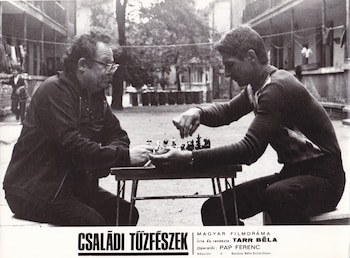
Su obra continuó con Szabadgyalog (El intruso) en 1980 y Gente prefabricada en 1981, esta última la primera en incluir actores profesionales como protagonistas. El giro radical en su estilo comenzó con una adaptación de Macbeth en 1982, rodada en vídeo y estructurada en solo dos actos, donde la condensación narrativa y la fidelidad al texto original marcaron su nueva etapa.
En lo visual, Tarr evolucionó hacia la experimentación con planos largos y una mirada metafísica, tono que lo emparenta con cineastas como Andrei Tarkovsky. Sus referencias más explícitas incluyen la pintura de Brueghel, el cine de Jancsó y, en menor medida, la obra de Rainer Werner Fassbinder, aunque siempre ha subrayado que no sigue dogmas estéticos fijos.
La colaboración con el novelista László Krasznahorkai marcó el inicio de su madurez creativa tras el rodaje de Őszi almanach (Almanaque de otoño). Juntos firmaron tres películas, comenzando con Kárhozat (La condena) en 1988, cuya puesta en escena explora los laberintos de la soledad, los celos y la traición a través de movimientos pausados y ambientes cerrados. El tratamiento metafórico y fragmentario del relato se convirtió en una de las señas de identidad de Tarr.

Sátántangó (Tango satánico), estrenada en 1994 y basada en una novela de Krasznahorkai, requirió una planificación de siete años y una duración inusual de 415 minutos (siete horas). La película relata el fracaso de una granja colectiva en la Hungría poscomunista y es considerada una de las cumbres de su filmografía. La escritora Susan Sontag expresó: “Volvería a ver Sátántangó una vez cada año”, ampliando el reconocimiento de Tarr ante la crítica internacional.
A partir de entonces, solo realizó obras muy breves, dedicando meses a la filmación de una sola toma. En Sátántangó, por ejemplo, la cámara acompaña el avance de una manada de vacas alrededor de un pueblo, o sigue durante largo tiempo la deriva de un personaje impulsado a abandonar su hogar. El trabajo coral y el tratamiento del tiempo en el relato se intensificaron con el paso de los años.
Tras rodar Werckmeister Harmóniák (Las armonías de Werckmeister) en el año 2000, con actores como Hanna Schygulla, Tarr rubricó un nuevo giro hacia la narración fantástica y la reflexión filosófica. La película, centrada en la llegada de una ballena a un pueblo y la búsqueda de nuevas armonías musicales, explora los límites de la violencia y la utopía social. El crítico Peter Hames comentó: “La película nos ofrece además la ilusoria búsqueda de la perfección de tono y escala perseguida por Eszter, la maravilla de la ballena (una cosa bella convertida en una monstruosidad circense) y la hermosura de la película misma”.
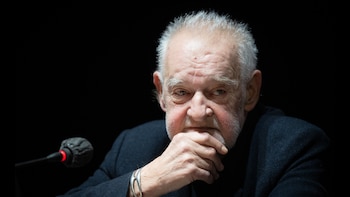
Con A Londoni férfi (El hombre de Londres), presentada finalmente en Cannes en 2007 tras el suicidio en 2005 del productor Humbert Balsan, Tarr volvió a articular relatos mediante planos secuencia extensos y una narrativa que experimenta con el flujo del tiempo.
En 2011, el director húngaro estrenó su última obra, A Torinói ló (El caballo de Turín), donde narra la existencia rutinaria de un padre y su hija en una granja azotada por el frío, y anunció que no volvería a dirigir. Desde entonces, su influencia sigue vigente en los estudios fílmicos, y sus películas circulan, finalmente, entre los públicos internacionales.
Durante mucho tiempo, las películas más tempranas del cineasta estuvieron prácticamente inaccesibles en formato doméstico fuera de Japón. Solo desde mediados de la década de 2000, títulos emblemáticos como Nido familiar, Las armonías de Werckmeister, La condena, El hombre de Londres y El caballo de Turín pasaron a estar disponibles en español, mostrando el lento pero efectivo avance de su legado.
Nobel2025Nobel Banquet,Entertainment,Nobel party,Nobel,Nobel Prize,nobel2025,Culture,the banquet,Arts,The Nobel Dinner,Arts / Culture / Entertainment,Europe
INTERNACIONAL
Walz decision to exit governor race intensifies calls from GOP lawmakers for his resignation: ‘Easy way out’

NEWYou can now listen to Fox News articles!
Democratic Gov. Tim Walz announced on Monday he is scrapping his re-election campaign for another term amid a massive fraud scandal in the state, but Republican lawmakers in Minnesota are calling the move an empty one.
«Don’t mistake Gov. Walz’s retirement for accountability,» Minnesota state Sen. Mark Koran said in a statement to Fox News Digital after Walz’s Monday announcement.
«It’s an attempt to avoid it. Republicans will keep holding ALL elected Democrats accountable for Minnesota’s fraud mess, spending every dollar of the $18 billion surplus, and raising taxes by $10 billion.»
Accountability for Walz, according to several Republican lawmakers, involves him resigning as governor, which many have called for in recent months.
CRITICS WARN MINNESOTA LEGISLATION NOW TAKING EFFECT IS SETTING UP THE ‘NEXT BILLION-DOLLAR FRAUD’
GOP lawmakers in Minnesota are not dropping their calls for Gov. Tim Walz to resign. (Getty Images)
«The Governor is taking the easy way out, but it’s not good enough,» state Sen. Michael Holmstrom said in a statement. «Minnesotans deserve and demand an IMMEDIATE resignation.»
«Governor Walz couldn’t take the FRAUD heat so he’s getting out of the kitchen, but I’m going to keep holding ALL Democrats accountable for Minnesota’s fraud mess, blowing through the entire $18 billion surplus, raising taxes by $10 billion, and making life less affordable for all Minnesotans while rejecting Republican efforts to stop fraud. I’ll keep exposing these failures and holding Democrats accountable for what they’ve done to Minnesotans.»
Walz launched his bid for a third four-year term as Minnesota governor in September, but in recent weeks has been facing a barrage of incoming political fire from President Donald Trump and Republicans, and some Democrats, over the large-scale theft in a state that has long prided itself on good governance.
HOW FEARS OF BEING LABELED ‘RACIST’ HELPED ‘PROVIDE COVER’ FOR THE EXPLODING MINNESOTA FRAUD SCANDAL

The sun shines on the Minnesota State Capitol. (Steve Karnowski/Associated Press)
More than 90 people — most from Minnesota’s large Somali community — have been charged since 2022 in what has been described as the nation’s largest COVID-era scheme. How much money has been stolen through alleged money laundering operations involving fraudulent meal and housing programs, daycare centers, and Medicaid services is still being tabulated. But the U.S. attorney in Minnesota said the scope of the fraud could exceed $1 billion and rise to as high as $9 billion.
GOP state Sen. Rich Draheim accused Walz in a statement of simply «passing the buck» with his «retirement» announcement while «blaming Republicans for his failures.»
Minnesota Republican Sen. Andrew Lang echoed the messaging from his state party in a statement concluding that «retirement isn’t accountability.»
«It’s him trying to wipe his hands clean of the fraud mess. But ALL elected Democrats own this. They fought Republican efforts to stop the fraud, failed to hold Walz’s agencies accountable, and let Minnesotans’ tax dollars get siphoned off by fraudsters.»
Walz met Sunday with Democratic Sen. Amy Klobuchar of Minnesota to discuss his decision to drop his re-election bid, a source familiar confirmed to Fox News’ Alexis McAdams.
CLICK HERE TO DOWNLOAD THE FOX NEWS APP
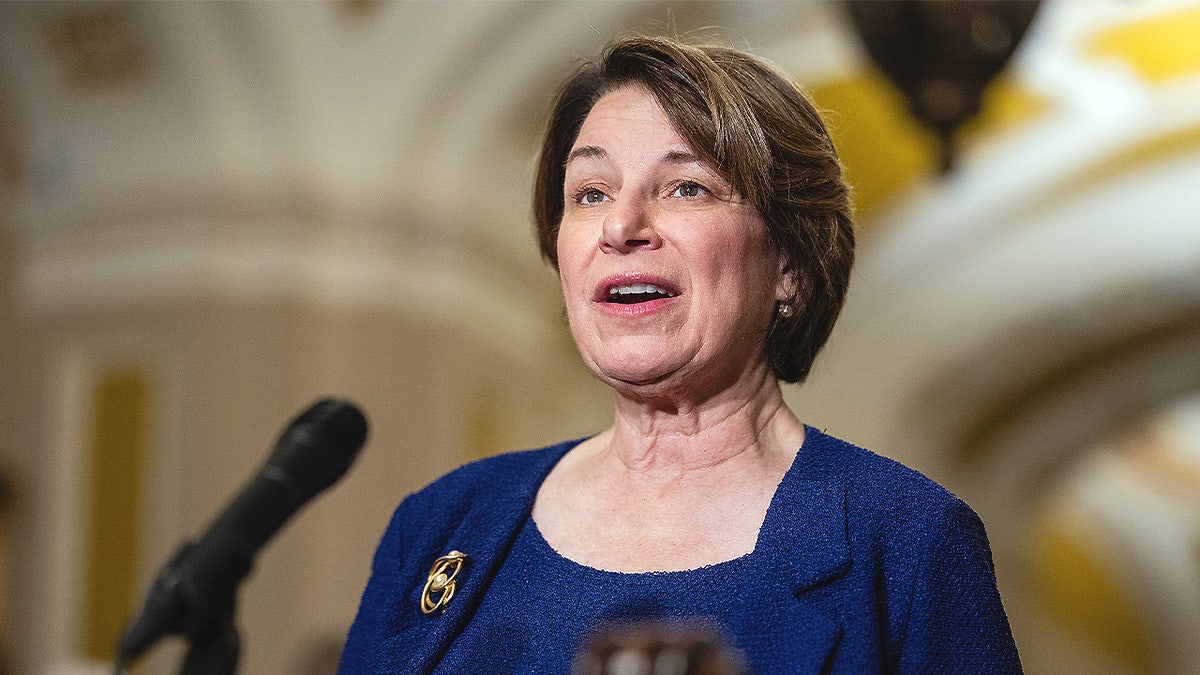
Sen. Amy Klobuchar, D-Minn. (Bloomberg/Getty)
Word of their meeting comes amid speculation that Klobuchar, a former Hennepin County attorney who’s been elected and re-elected four times to the U.S. Senate, may now run to succeed Walz.
«Make no mistake, I don’t want Tim Walz to be our governor,» Minnesota Republican state Sen. Andrew Mathews said in a statement to Fox News Digital. «But rather than swapping Democrat governor candidates, I want to FIX the damage Gov. Walz has done: Blew through an $18 billion surplus, Raised taxes by $10 billion, Oversaw one of the largest fraud scandals in the country, Left Minnesota for months chasing a failed VP bid, Now decides to leave office.»
«This isn’t accountability. It’s avoiding it.»
Fox News Digital’s Paul Steinhauser contributed to this report.
politics,minnesota fraud exposed,tim walz
INTERNACIONAL
Nobel Peace Prize recipient Machado pledges to return to Venezuela, sees ‘alarming’ internal crackdown

NEWYou can now listen to Fox News articles!
Venezuelan opposition leader Maria Corina Machado has vowed to return to Venezuela «as soon as possible» following America’s capture of dictator Nicolás Maduro, warning that the current regime is escalating an internal crackdown on dissent and journalists.
Speaking to «Hannity» on Monday, Machado said the moment is now right for her return after spending more than a year in hiding. She secretly escaped Venezuela last month and traveled to Norway to receive the Nobel Peace Prize, which she dedicated to President Donald Trump.
«Well, first of all, I’m planning to go back to Venezuela as soon as possible,» Machado said.
TRUMP ISSUES DIRECT WARNING TO VENEZUELA’S NEW LEADER DELCY RODRÍGUEZ FOLLOWING MADURO CAPTURE
Opposition leader Maria Corina Machado gestures during an anti-government protest on Jan. 9, 2025, in Caracas, Venezuela (Jesus Vargas/Getty Images)
«As I’ve always said, Sean, every day I make a decision where I am more useful for our cause. That’s why I stayed in hiding for over 16 months, and that’s why I decided to go out, because I believed that at this moment I’m more useful to our cause, being able to speak out from where I’m at right now. But I’m going to go as soon possible back home.»
Machado said developments in the past 24 hours have been deeply concerning, pointing to what she described as a sweeping executive order signed by Maduro on the same day he was captured and flown out of the country by U.S. forces.
«What we’re seeing right now in the last 24 hours is really alarming,» she said.
Machado said the order mandates the persecution of Venezuelans who support Trump’s actions and claimed at least 14 journalists have been detained. A state of emergency decree issued Saturday, but published Monday, orders police to «immediately begin the national search and capture of everyone involved in the promotion or support for the armed attack by the United States,» the text of the decree reads, according to Reuters.
She said the situation must be closely monitored by the United States and the Venezuelan people, arguing that the transition away from Maduro must continue.
BONDI SAYS TRUMP ‘SAVED COUNTLESS LIVES’ IN VENEZUELAN DICTATOR MADURO CAPTURE OPERATION

Nicolás Maduro is seen in handcuffs after landing at a Manhattan helipad, escorted by heavily armed federal agents as they make their way into an armored car en route to a federal courthouse on Jan. 5, 2026, in New York City (XNY/Star Max/GC Images via Getty Images)
«So this is very alarming. This is something that has to be followed carefully, I’m sure, by the United States government and by the Venezuelan people,» she said. «And certainly we believe that this transition should move forward.»
Machado also sharply criticized Venezuelan Vice President Delcy Rodríguez, calling her unfit to lead any transitional authority. Rodríguez, who has been vice president under Maduro since 2018, was sworn in as interim president on Monday.
«Delcy Rodriguez, as you know, is one of the main architects of torture, persecution, corruption, narco trafficking,» Machado said. «She’s the main ally and liaison with Russia, China, Iran, certainly not an individual that could be trusted by international investors. And she’s really rejected, repudiated by the Venezuelan people.»
CLICK HERE TO DOWNLOAD THE FOX NEWS APP
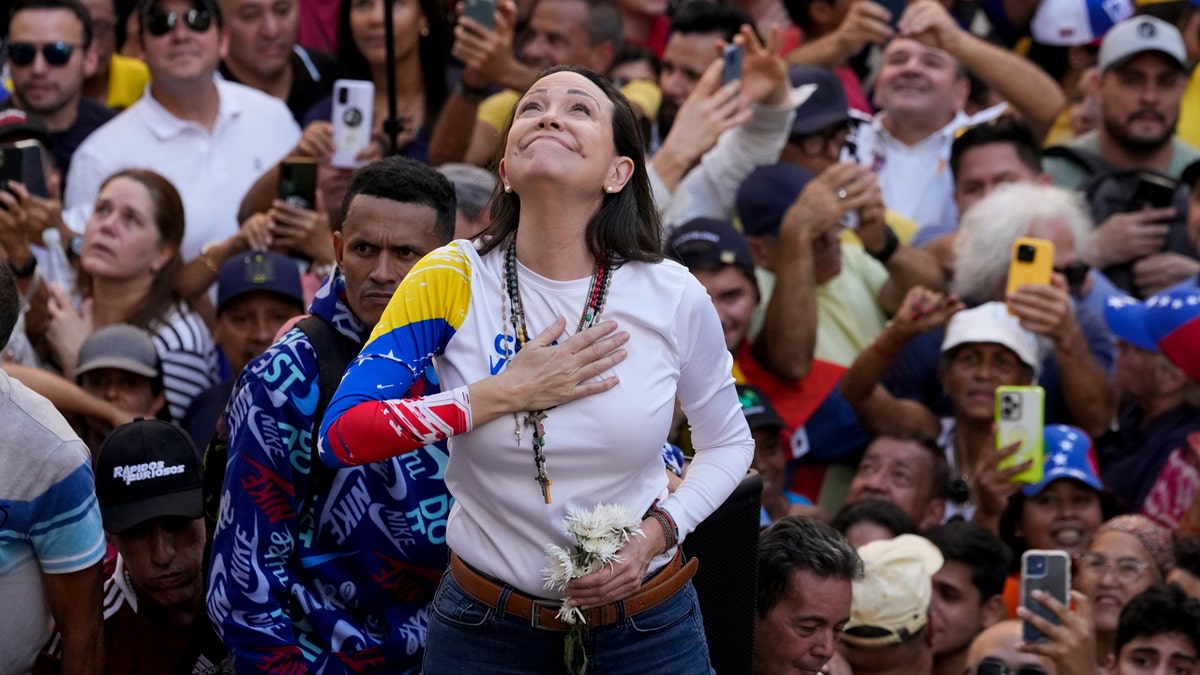
Venezuelan opposition leader Maria Corina Machado addresses supporters at a protest against President Nicolás Maduro in Caracas, Venezuela, Thursday, Jan. 9, 2025, the day before his inauguration for a third term. (AP Photo/Ariana Cubillos)
Machado’s comments came just two days after the Trump administration announced that U.S. forces had captured the dictator and his wife, Cilia Flores, after successful «large-scale» military strikes targeting the Venezuelan government. The dictator and his wife are now being held in New York while they await trial on narco-terrorism charges.
Fox News’ Maria Lencki and Louis Casiano contributed to this report.
world,politics,geopolitics,south america,crime world,donald trump

 CHIMENTOS3 días ago
CHIMENTOS3 días agoEl inesperado acercamiento de Wanda Nara a un ex de la China Suárez que desató un escándalo: “El like a Rusherking que nadie esperaba”

 CHIMENTOS2 días ago
CHIMENTOS2 días agoLuis Ventura reveló los motivos detrás de la pelea de Juana Repetto y su hermano Bautista Lena: “Esto viene de crianzas y culturas diferentes”, analizó

 INTERNACIONAL22 horas ago
INTERNACIONAL22 horas ago‘Nos están invadiendo’: El ataque de EE.UU. visto desde los celulares de venezolanos



























